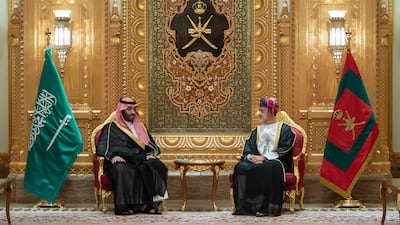The visit of Saudi Crown Prince Mohammed bin Salman to Oman could bring a financial windfall to the sultanate with projects worth $10 billion – ranging from oil and gas to the maritime sector – an Omani government official said on Tuesday.
Prince Mohammed arrived in Muscat on Monday to start his tour of GCC countries and is expected to leave Oman on Tuesday for the United Arab Emirates.
According to state-owned Oman Television, hours before Prince Mohammed’s arrival in Muscat, Saudi and Omani officials signed 13 agreements.
“The Saudi and Omani officials, under the Saudi Arabia-Oman Business Council, signed 13 agreements to set up projects in Oman to invest in oil, gas, tourism, green energy, maritime, logistics, ports, telecommunications and an industrial zone,” Oman Television reported on Tuesday.









Oman Television did not say how much the total cost of the projects would amount to, but one of the Omani officials who was involved in the signing revealed the value.
“The contract signings for these projects are worth $10 billion, which is a big boost for the Omani economy at a time when Oman needs the cash flow to diversify the economy away from oil income,” the official told The National.
Oman has embarked on an ambitious economic development plan – Vision 2040 – to wean its economy off oil revenues and introduce medium-term measures to rein in its debt, which has grown in recent years.
The Saudi crown prince held talks with Sultan Haitham bin Tarek, which officials said were focused on ongoing nuclear negotiations between Iran and the West, resolving regional conflicts and increasing co-operation between their countries.
Foreign diplomats said they expected Oman to reap the benefit of its role as a mediator on regional conflicts, including Yemen.
“We were expecting this project windfall because Oman has been working tirelessly as a mediator for both Iran and Yemen and will continue on this path in the future until a peaceful settlement is found,” a foreign diplomat told The National.
Gulf Co-operation Council (GCC) Secretary General Nayef Falah Al Hajraf said the timing of the Saudi royal's tour plays an important role in strengthening ties among Gulf nations ahead of the GCC summit next week.
"The Gulf tour reinforces hopes, aspirations and close ties which connect the GCC states," he said in a statement.
Roads and refineries
Oman and Saudi Arabia this year announced the construction of a motorway linking the two neighbours through the Empty Quarter desert region.
The motorway, more than 700 kilometres long, will start from Ibri, a town in south-west Oman, and end in Alkwifriah in Al Ahsa, eastern Saudi Arabia.
Abdullah Saud Al Anzi, the kingdom's ambassador to Muscat, said the motorway would be opened soon.
Oman Television also said that Saudi Arabia will invest in projects in Duqm in central Oman, where the sultanate has its biggest economic zone.
The biggest project in Duqm is a 230,000 barrel per day oil refinery, which is expected to be completed during the first quarter of 2023. It is a 50-50 joint venture between Oman’s state-owned OQ and Kuwait Petroleum International.
Prince Mohammed’s tour will take in all five fellow members of the Gulf Co-operation Council – Oman, the UAE, Bahrain, Qatar and Kuwait.
It will be his first visit to Qatar since the AlUla summit in January ended a rift in the GCC and re-established ties between Doha on the one hand, and Saudi Arabia, the UAE and Bahrain.
Saudi Arabian state media reported that the tour would be focused on ways to enhance co-ordination between GCC states and measures to strengthen the work of the regional body, before the leaders’ summit in mid-December.


